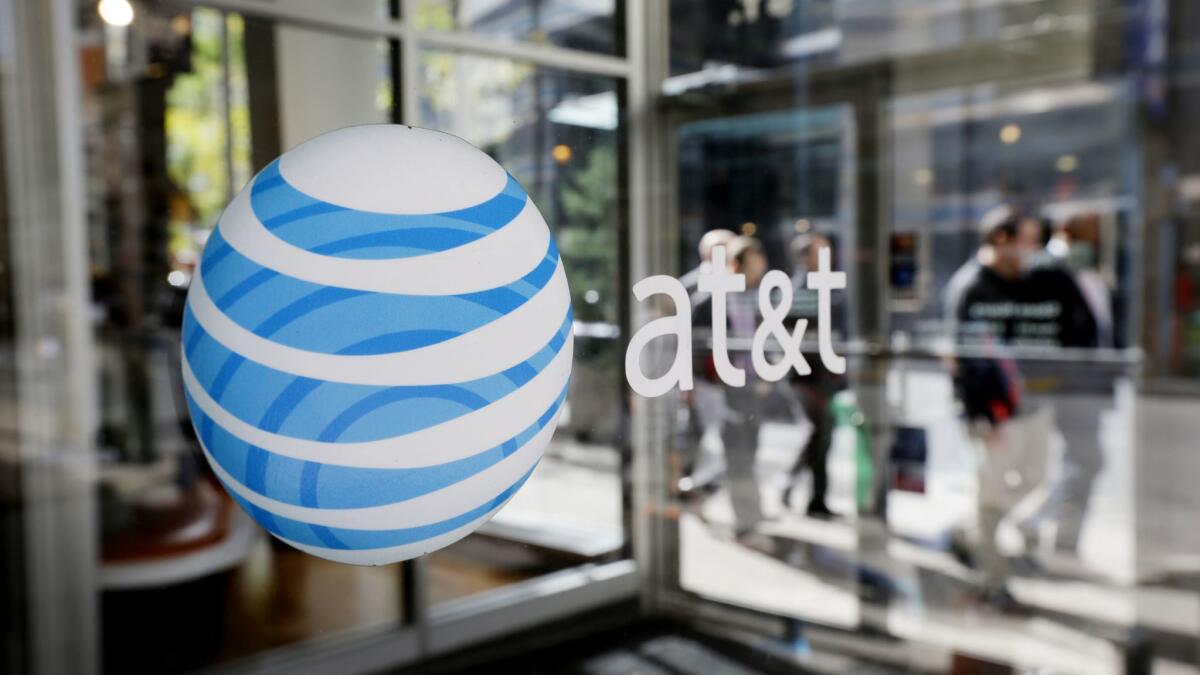AT&T under pressure to sell DirecTV amid heavy subscriber losses

- Share via
Telecommunications giant AT&T is facing mounting pressure from an activist shareholder to pare down its operations by unloading the El Segundo-based satellite television giant DirecTV, which has been reeling from the loss of millions of subscribers.
Elliott Management Corp. of New York, which owns a $3.2-billion stake in AT&T, lobbed a missive last week that was sharply critical of AT&T management and its operations. The hedge fund rebuked the Dallas company’s decision to spend more than $150 billion to become an entertainment colossus by purchasing DirecTV four years ago, as well as WarnerMedia, which includes HBO, CNN and the Warner Bros. television and movie studio in Burbank.
AT&T Chairman and Chief Executive Randall Stephenson has said the company is reviewing Elliott Management’s proposals.
On Wednesday, the Wall Street Journal reported that AT&T was exploring spinning off its DirecTV subsidiary into a separate company and combining it with rival satellite TV competitor Dish Network. The move would mark a dramatic retrenchment for AT&T, which has loaded up on debt to finance its acquisition strategy while also spending billions of dollars to upgrade its mobile phone networks to support next-generation technology, known as 5G.
AT&T declined Wednesday to comment on the report, as did a spokesman for Dish Network.
However, a person familiar with the matter, who was not authorized to speak publicly, downplayed the report, saying: “There are no discussions happening between the two companies because of regulatory issues.”
Dish Chairman Charlie Ergen said at an investor conference Tuesday that merging DirecTV and Dish “always made sense.” But he noted the question was whether such a marriage “would pass regulatory muster.”
In 2001, DirecTV, then owned by Hughes Electronics Corp., and Englewood, Colo.-based Dish tried to combine, but the federal government refused to allow the merger. The government was worried that rural subscribers would have only one option for pay-TV service if the two satellite TV companies came together. However, now there are multiple options for consumers, including streaming services such YouTube, Hulu and Dish’s Sling TV.
AT&T also would be wary of any more battles with the U.S. Justice Department. The company spent nearly two years in court with President Trump’s agency to win approval of the company’s purchase of Time Warner Inc., which has since been renamed WarnerMedia. Trump has made clear his displeasure over CNN’s coverage of him, and the Justice Department twice tried to block that merger. AT&T finally acquired WarnerMedia in June 2018, but the court wrangling dragged on until February this year.
Elliott Management, in its letter, noted that AT&T has spent more than $200 billion in deals during the last few years. AT&T spent $109 billion for WarnerMedia, including debt. The 2015 purchase of DirecTV cost an additional $67 billion.
“Unfortunately, it has become clear that AT&T acquired DirecTV at the absolute peak of the linear TV market,” Elliott Management said in its Sept. 9 letter to AT&T’s board.
AT&T has lost nearly 3 million pay-TV subscribers in the last two years as consumers have defected to lower cost streaming services. This week, Stephenson, himself under pressure, told investors to brace for another rough quarter because of a blackout of CBS and Nexstar TV stations, which led to the loss of about 300,000 additional DirecTV subscribers.
Elliott Management criticized AT&T’s handling of its DirecTV Now streaming service, which was recently branded AT&T TV Now and has also been losing subscribers. This week investors filed a class action lawsuit alleging that AT&T pressured employees to create bogus accounts to inflate the subscriber numbers. AT&T said the claims were meritless.
AT&T already has been working to hone its strategy. Part of that includes launching another streaming service, dubbed HBO Max, next year to compete with Netflix, Walt Disney Co., Amazon’s Prime Video and Apple.
“We’ve been under the impression the company is already focused on some of these things including 1) improving execution, 2) not planning to do more big mergers and acquisitions and 3) is planning to sell more non-strategic assets,” Colby Synesael, telecommunications analyst with Cowen & Co., wrote last week. However, Synesael noted that AT&T’s current plans to slim down are probably not as ambitious as Elliott would like.
The problem is, beyond Dish Network, there appear to be no other logical partners willing to absorb DirecTV as it hemorrhages subscribers.
“DirecTV is a mess, but would it be worth more if it were spun out, or even merged with Dish Network? Probably not,” telecommunications analyst Craig Moffett wrote in a report last week.
More to Read
Inside the business of entertainment
The Wide Shot brings you news, analysis and insights on everything from streaming wars to production — and what it all means for the future.
You may occasionally receive promotional content from the Los Angeles Times.











